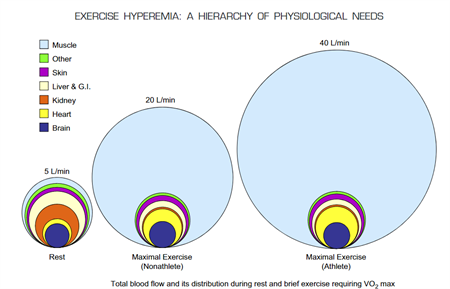Joseph Watso, B.S. |
Oct.
3, 2018
This is part eight of a series of blogs from attendees at ACSM's Conference on Integrative Physiology of Exercise. The following blog is a reflection on the symposium titled "Exercise Pressor Reflex Function in Health and Disease" by Joseph Watso.
When we hit the trails or hop on the treadmill for a run we rely on complex mechanisms that provide blood flow to deliver nutrients (such as oxygen) to our active muscles. Unfortunately, disease states like heart failure, hypertension and peripheral artery disease (PAD) affect the reflexes vital for keeping enough blood flow to our muscles. Therefore, it is essential that we understand what might be going wrong to inform disease prevention, maintenance and treatment strategies.
To help appreciate the processes of which the body is capable, check out the image below. Each circle represents the amount of blood flow going to each organ. We can have tremendous increases in blood flow delivery during exercise (light blue areas).

At ACSM’s Conference on Integrative Physiology of Exercise, Marc Kaufman, Ph.D., of Penn State Hershey pulled together a group of experts to discuss the mechanisms underlying exercise pressor reflex dysfunction.
Donal O’Leary, Ph.D., a professor at Wayne State University, and Dr. Kaufman discussed the intricate research projects they have completed using animal models to better understand the altered blood flow and blood pressure responses during exercise exhibited in heart failure and PAD. Specifically, Dr. O’Leary showed the results from a line of studies focused on how metabolite build up from exercise affects the integrative control of cardiac and peripheral blood flow in an animal model of heart failure. Namely, there is a pronounced switch from cardiac output mediated increases in blood flow/pressure to a compensatory reliance on systemic vasoconstriction.
University of Utah investigator Markus Amann, Ph.D., described the multifaceted ongoing research projects in human heart failure and exercise pressor reflex function. These experiments include a range of invasive techniques that provide an understanding of the role of the central nervous system in blood pressure control during aging and in heart failure.
Hypertension affects a great deal of individuals in the United States. Dr. William Farquhar, FACSM, from the University of Delaware, described how microneurography has allowed scientists to link sympathetic nervous system overactivity to altered cardiovascular reflexes during exercise in hypertension. Dr. Farquhar also presented data demonstrating the importance of chronic exercise training to prevent the development of high blood pressure.
Together, these scientists, and others in the field, will continue to carry out clinically relevant research to better understand how different cardiovascular disease processes affect exercise blood flow and pressure regulation.
Scott Powers, Ph.D., FACSM, and other conference organizers did an excellent job setting up thought-provoking scientific sessions at the 2018 Integrative Physiology of Exercise conference. We hope you can attend and join in on the conversation next time.
Read part 1 of this series: "Can Exercise Fill the Reductionist Gap? Reflections on Dr. Michael Joyner's Keynote."
Read part 2 of this series: "Are Exercise 'Mimetics' a Realistic Substitute for Exercise Training? Reflections on the Debate."
Read part 3 of this series: "Exercise and Energy Restriction to Improve Health: Recent Research."
Read part 4 of this series: "Molecular Transducers of Physical Activity (MoTrPac) Update."
Read part 5 of this series: "Metabolic Flexibility in Health & Disease: A Symposium Summary."
Read part 6 of this series: "How Exercise Promotes Brain Health in Aging."
Read part 7 of this series: "Molecular Transducers of Exercise-Induced Muscle Hypertrophy: A Symposium Summary."
Joseph C. Watso, B.S., is a doctoral candidate at the University of Delaware, in the Department of Kinesiology and Applied Physiology. Joe is currently serving as the graduate student representative for the Mid-Atlantic Regional Chapter of ACSM. Joe is interested in studying human health and performance, with specific interests in maintaining cardiovascular health throughout aging.